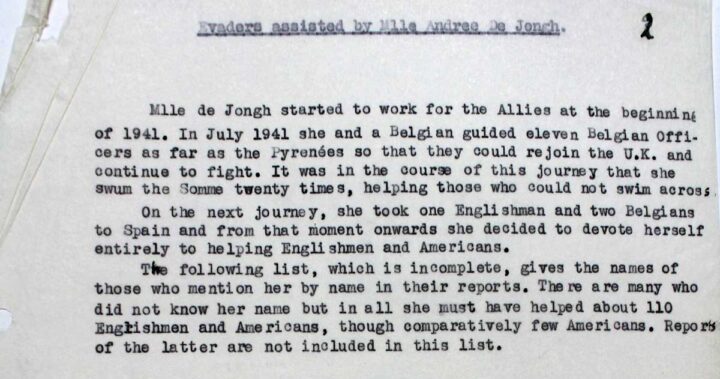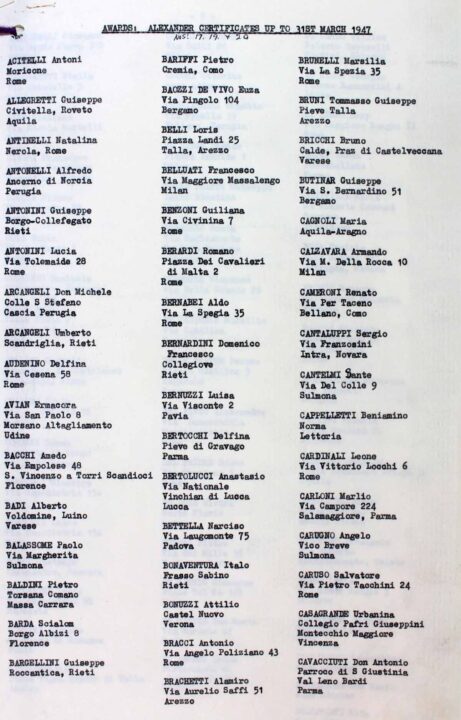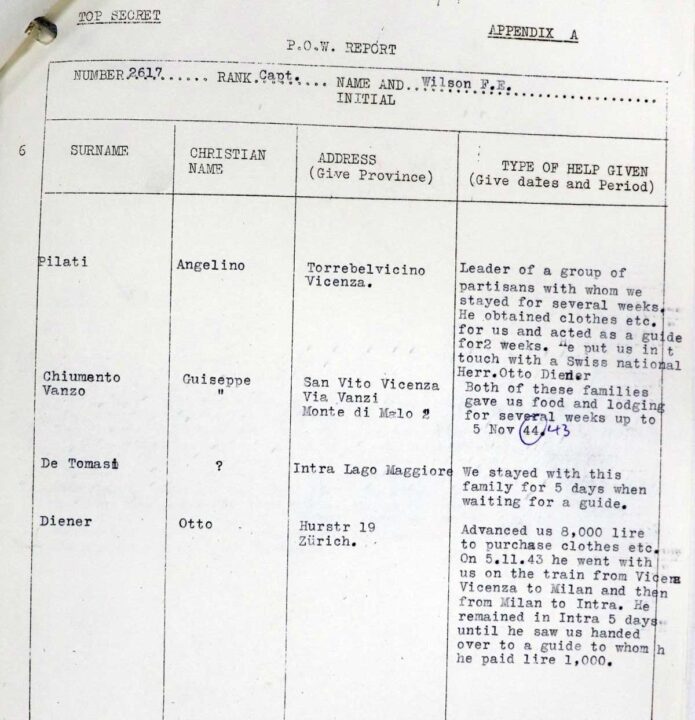
By Keith Mitchell, Volunteer Projects Officer, November 2023
What stories came to light during a recent volunteering project? Keith Mitchell explains in this blog about the work to index record series WO 208, containing details of the people who assisted Allied prisoners of war attempting to escape to friendly or neutral territory during the Second World War.
Keith has worked at The National Archives for over 20 years, and currently supervises both remote and onsite volunteering projects.
The project
Our volunteers have been working to index the records of prisoners of war who either evaded, escaped or were liberated during the Second World War, in the records series WO 208. Part of this project included capturing the names of those who helped the Allied servicemen. These records capture details of the civilians and individuals who gave assistance and aid to the men attempting to escape to friendly or neutral territory.
The helpers are listed in various ways. This project aimed to index the files which include details of the honour awarded, or length of service. Some of the records include addresses, dates and place of birth. Where the birth year is stated as being less than 100 years ago then our online catalogue, Discovery, will only give minimal information. Where the records are just large lists of names, we have not catalogued name details, just improved the description of each archival piece.
Some of the names are well known, and this project makes searching for allied helpers more accessible.
Award recipients
The awards vary from a Posthumous award to MBE (Civil). Awards were made to nationals from countries including France, Belgium, Greece, Italy Holland. The volunteers have helped identify some of the names that appear.
The Comet Line was an escape and evasion route set up in Belgium to aid Allied airmen and soldiers escaping German occupied territory. A Belgian, Andree de Jongh, born 1905, Brussels, organised and ran the Line (see: Little Cyclone: the girl who started the Comet Line by Neave, Airey, 1916-1979). She received the George Medal for her bravery. She was arrested in 1943, and incarcerated for the remainder of the war.
She is mentioned in WO 208/5452:

Report on Andree de Jongh. Catalogue reference: WO 208/5452
Which, transcribed, says:
Evaders assisted by Mlle Andree De Jongh.
Mlle de Jongh started to work for the Allies at the beginning of 1941. In July 1941 she and a Belgian guided eleven Belgian Officers as far as the Pyrenées so that they could rejoin the U.K. and continue to fight. It was in the course of this journey that she swum the Somme twenty times, helping those who could not swim across.
On the next journey, she took one Englishman and two Belgians to Spain and from that moment onwards she decided to devote herself entirely to helping Englishmen and Americans.
The following list, which is incomplete, gives the names of those who mention her by name in their reports. There are many who did not know her name but in all she must have helped about 110 Englishmen and Americans, though comparatively few Americans. Reports of the latter are not included in this list.
The King’s Medal for Courage in the Cause of Freedom was an award instituted in 1945. One recipient was Janine Lambertine Marie Angele de Greef. She was a courier with the resistance movement, and again involved in the Comet Line (catalogue reference: WO 208/5452/97).
Antione d’Ursel was also a member of the Belgian nobility. Born 1896 in Brussels, he became an important part of the Comet Line. The records show the award was a Posthumous Commendation (catalogue reference: WO 208/5452/17. He drowned whilst trying to cross into Spain. Other awards for members of the Comet Line include Georges and Edouard d’Oultremont.
The Shelburn escape line was set by Paul Campinchi, based in Paris. His line helped escaping or evading airmen. The airmen were transported from various Paris safe houses to the Breton coastline, where a British Corvette picked them up and took them home. Paul Francois Campinchi was awarded the OBE (civil).
The records are not just for France and Belgium. There are records for Italians who aided the Allies when they were released following the Armistice of September 1943. Allies were allowed to leave the camps before the Germans arrived to transport them to Germany. These prisoners of war either headed south to the allied lines, or to neutral Switzerland. Further information on Italian helpers can be found on the Monte San Martino Trust Archives.

Part of a list of Italian helpers. Catalogue reference: WO 208/5479
The Vatican was neutral but Monsignor O’Flaherty, an Irishman in the Vatican aided allied servicemen in their escape. A note on his help can be found in WO 208/5585. He was awarded a CBE (catalogue reference: WO 208/5451/41).
A high proportion of the awards are those recommendations for a posthumous award. These were to those who aided the Allies and were then subsequently arrested and executed by, or died trying to escape, the Gestapo. A large proportion of the those who helped the allies were either arrested or killed. Madame Marie Mathilde Glaub, a 54 year old French woman, helped shelter feed allied evaders in Paris. She was left a cripple following her arrest and imprisonment in July 1944 (catalogue reference: WO 208/5452/72).
Interviews and reports
It is not just in these records of honours and awards where names of civilian helpers can be found. The interviews of Allied servicemen also mention names and details of those who aided their escape.
Captain Frederick Edward Wilson of the 2nd Battalion, New Zealand Expeditionary Force was captured in Africa on 26 November 1941. In September 1943 the Germans took control of the prisoner of war camp he was incarcerated in, PG 5, in Gavi, Italy. Captain Wilson and a Major Straker eventually escaped and made their way to Switzerland. On their journey they were aided by numerous people, and Captain Wilson’s report includes details of these helpers. These helpers may not have received any further recognition for their efforts, other than a note in Appendix A of these reports.

Appendix A of Captain Wilson’s prisoner of war report. Catalogue reference: WO 208/4276
These recommendations were not gazetted or published, as the records state that ‘If this recommendation is approved, no citation should be given’. The awards were not just to those who organised or assisted with the official escape Lines, but to those who gave help and their lives.
These records would have remained ‘hidden’ without the work of The National Archives’ volunteers. Their continued time helps open up our records and makes them more accessible.